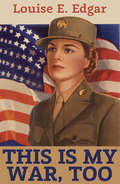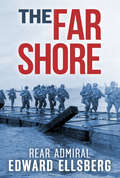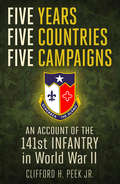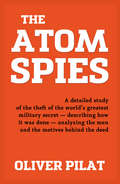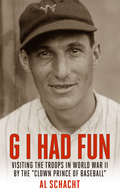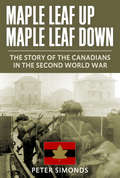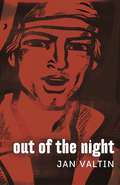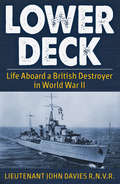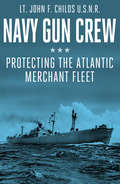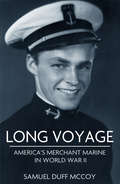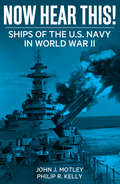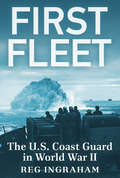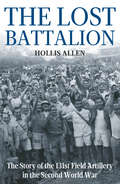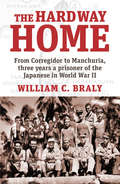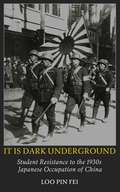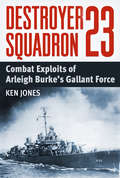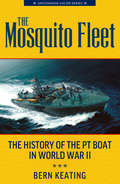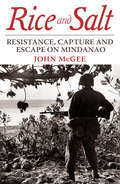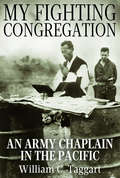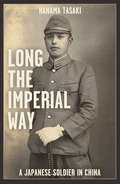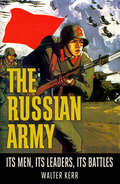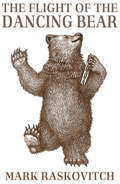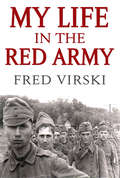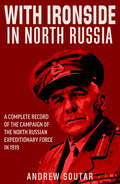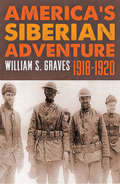- Table View
- List View
This is My War, Too
by Louise E. EdgarThis Is Our War, Too, first published in 1950 as Out of Bounds, is the story of one woman’s experiences in the WAC’s (Women’s Army Corps), during the later days of World War Two. This Is Our War, Too unfolds in a fast-paced, often sassy manner, with a large dose of humor thrown in to help author Louise Edgar cope with Army-life as a woman, and also with the widespread devastation she witnessed. Her story takes the reader to New Guinea, Papua, Manila, and Shanghai, where Edgar describes her observations of life in these war-torn countries. The book ends with her return to the States and the start of her civilian life.
The Far Shore
by Rear-Admiral Edward EllsbergThe Far Shore, first published in 1960, is a classic account of the Allied D-Day landings in France in June 1944 by U.S. Navy Admiral and popular author Edward Ellsberg (1891-1983). Described in detail are the massive preparations for the invasion, the Nazi defenses along the Normandy beaches, and the ingenious creation of the Mulberry artificial floating harbor which would prove vital in securing the Allied beachhead in France. Illustrated throughout with clear drawings of the types of landing craft used, the beach barriers facing the ships and troops, the Mulberry harbor units, and several maps.
Five Years Five Countries Five Campaigns: An Account of the One-Hundred-Forty-First Infantry in World War II
by Clifford H. Peek Jr.Five Years, Five Countries, Five Campaigns, first published in 1945, is the account of the activities of the U.S. Army’s 141st Infantry Regiment (36th Division) during World War II. Based in San Antonio Texas, and part of the Texas National Guard, on November 20, 1940, the men changed from civilians to citizen-soldiers by presidential order. Additional recruits were added, followed by intensive training, and, by April 1943, the Regiment was in North Africa, then Italy, France, Germany, and Austria. Some notable firsts for the 141st Infantry included: among the first American troops to land on the continent of Europe in World War II; among the first troops to enter Rome; the first Infantry Regiment to land on the coast of southern France; the first Regiment in the Seventh Army to cross the Moselle River; and the first 36th Division troops to enter Germany. Their combat record was also impressive: from September 9, 1943, until the end of the war, the Regiment experienced 361 days of combat (137 days in Italy, 204 days in France, 17 days in Germany, 4 days in Austria). During this period, the Regiment sustained more than 6,000 casualties, including 1,126 killed, approximately 5,000 wounded, and over 500 missing in action. Five Years, Five Countries, Five Campaigns provides an in-depth look at this Regiment, with descriptions of the Regiment’s fighting at Salerno, River Rapido, Monte Cassino, in the Alsace region, and more. Included are 15 pages of maps.
The Atom Spies
by Oliver PilatThe Atomic Spies, first published in 1952, remains one of the best accounts of the Soviet atomic espionage rings operating in the U.S. during the 1940s and early 1950s. Tracing the lives of the major players working for the Soviets - Julius and Ethel Rosenberg, Klaus Fuchs, Ruth and David Greenglass - the book describes the clandestine meetings, the investigations of the FBI, and finally the trial for treason of the Rosenbergs which resulted in their execution in 1953. While new information has become available, especially on the true role of Ethel Rosenberg and the estimate of Julius Rosenberg’s work as a Soviet agent, The Atom Spies well-captures the mood of the times and provides valuable insight into the motives of those involved in providing the Soviets with closely guarded secrets of the U.S. program to build an atomic bomb.
G I Had Fun
by Al SchachtG I Had Fun, first published in 1945, is the inspiring World War Two account by major-league baseball player and coach Al Schacht. Schacht, known as the “Clown Prince of Baseball” for his hilarious antics, entertained thousands of troops in North Africa, Sicily, and the South Pacific on several USO tours. As the book’s jacket states, G I Had Fun is written “not as a comic trying to put over a gag, but as a humble human being who has been deeply moved by what he has seen. There is a depth of sincerity and feeling, as well as humor, that is wholly honest.” To the GI far from home, his efforts were much enjoyed and appreciated, and an important boost to the men’s morale. Schacht would later open a popular restaurant in New York City and sometimes perform his comedy routines for his guests. He passed away in 1984.
Maple Leaf Up Maple Leaf Down: The Story Of The Canadians In The Second World War
by Peter SimondsMaple Leaf Up, Maple Leaf Down, first published in in 1946, is an insightful look at the First Canadian Army and the Second World War in Europe, especially the history of Field Marshal Montgomery’s 21st Army Group. The book focuses on the role of the Canadian Army infantry, from the arrival of a single division in England in December 1939, through the Dieppe raid, the Sicilian and Italian campaigns, and finally to V-E Day. Included are 7 pages of maps.Author Captain Peter Simonds saw service in Europe from the Normandy campaign, through France, Belgium, Holland, and was in Germany until after the war ended. The title refers to World War II road signs posted in northwestern Europe marking the Maple Leaf Route, the supply line of the First Canadian Army: to move towards the front lines was termed “Maple Leaf Up,” while returning trucks carrying the wounded to the rear followed “Maple Leaf Down” signs.
Out of the Night (Nabat Ser.)
by Jan ValtinA bestseller in 1941, selected by the Book of the Month Club for a special edition and described by Book of the Month Club News as: “...full of sensational revelations and interspersed with episodes of daring, of desperate conflict, of torture, and of ruthless conspiracy...It is, first of all, an autobiography the like of which has seldom been.” The son of a seafaring father, Richard Julius Herman Krebs, a.k.a. Jan Valtin, came of age as a bicycle messenger during a maritime rebellion. His life as an intimate insider account of the dramatic events of 1920’s and 1930s, where he rose both within the ranks of the Communist Party and on the Gestapo hit list. Known for his honesty and incredible memory, Krebs dedicated his life to the Communist Party, rising to a position as head of maritime, organizing worldwide for the Comintern, only to flee the Party and Europe to evade his own comrade’s attempts to kill him. As a professional revolutionary, agitator, spy and would-be assassin, Krebs traveled the globe from Germany to China, India to Sierra Leon, Moscow to the United States where a botched assassination attempt landed him a stint in San Quentin. From his spellbinding account of artful deception to gain release from a Nazi prison and his work as a double-agent within the Gestapo, to his vivid depiction of a Communist Party fraught with intrigue and subterfuge, Krebs gives an unflinching portrayal of the internal machinations of both parties.
Lower Deck: Life Aboard a British Destroyer in WWII
by Lieutenant John DaviesLower Deck, first published in 1945, is a journal-like, exciting recounting of life aboard a Royal Navy destroyer, the H.M.S. Sikh (due to wartime regulations, the ship’s name in the book is the H.M.S. Skye); the ship is stationed in the eastern Mediterranean in the defense of Malta. Centering on the lives of the crewmen who are part of a gun crew, the book portrays the ship’s almost daily encounters with German and Italian ships and planes (as the author states: “...Daylight each morning brings with it almost complete certainty of attack...the comparatively confined waters, the proximity and strategic excellence of Axis air bases, means that to avoid discovery and attack is virtually impossible.”) Eventually, the Skye’s luck runs out and on September 14, 1942, she is sunk by German artillery with the loss of 115 men, with more men taken prisoner, and others rescued by nearby friendly ships. Includes a Glossary of naval terms used in the book.
Navy Gun Crew: Protecting the Atlantic Merchant Fleet
by Lieutenant John F. ChildsNavy Gun Crew, first published in 1944, is a firsthand look at a U.S. Navy gun crew assigned to a merchant marine ‘Liberty ship’ in the Atlantic during World War II. The Navy assigned a small gun crew to each merchant ship to provide protection against German U-boats and aircraft. In addition, one member of the crew was a signalman who could send and receive messages via signal flags and blinking light (radio use was limited to prevent the enemy from pinpointing the ship’s location). Navy Gun Crew examines the crew’s training, dockside duties, life at sea, encounters with submarines and aircraft, and a severe Atlantic storm. Although brief (the original book was 111 pages), it provides insight into a little-known yet vital part of the wartime effort to keep supplies flowing from the United States to Great Britain. Included are 27 pages of illustrations by Nils Hogner. Author Lt. John Childs (1910-2009) served in the U.S. Naval Reserve as head of a gun crew, followed by a long and successful finance career on Wall Street.
Long Voyage: America's Merchant Marine in World War II
by Samuel Duff McCoy Philip R. KelleyLong Voyage, first published in 1944 as Nor Death Dismay is the moving account of the unsung heroes of America’s Merchant Marine during the Second World War—those brave seamen who sailed the vital cargo-ships, facing unseen submarines and enemy aircraft. This well-written book focuses on the fleet of a large steamship company—the American Export Lines—whose ship’s plied the world’s oceans, and whose crews reported on their experiences at sea. Many ship’s owned by the company were sunk, forcing the crew’s to take to their lifeboats and trust their fate to the open sea, hoping for a speedy rescue that sometimes never came. The bravery and dedication of the crews remains a source of inspiration today.
Now Hear This!: Ships of the U.S. Navy in World War II
by John J. MotleyNow Hear This!, first published in 1947, is an account of the combat actions of representative ships of the U.S. Navy during World War II in all theaters of the War. Included are accounts of historic battleships such as the Missouri and Iowa, aircraft carriers such as the Hornet and Saratoga, cruisers, destroyers, and submarines, as well as the exploits of lesser known, but vital to the war effort, merchant marine ships, transport ships, landing craft, tender ships, store ships, PT boats, hospital ships, and even ‘lowly’ tugs. The accounts, prepared from official U.S. Navy records and from interviews with crew members, are succinct, yet authoritative, making Now Hear This! an invaluable reference to the military scholar or anyone interested in learning more about the U.S. naval fleet, and the service, drama, and hardships the ships and their crews faced as they battled enemy ships, submarines, aircraft, mines, sharks, violent weather, and more. Included is an Appendix listing ships receiving various commendations, a list of naval vessels lost during the war, and a chronology of important Second World War naval events. Also included are 16 pages of photographs.
First Fleet: The U.S. Coast Guard in World War II
by Reg IngrahamFirst Fleet, first published in 1944, is a fast-paced account of the important role played by the U.S. Coast Guard during the Second World War (with background chapters on the early history and peacetime activities of the Coast Guard). Featuring numerous interviews with servicemen in the U.S., Pacific, Atlantic, Mediterranean, and Greenland, First Fleet provides an insider’s look at the unsung heroes and vital work performed by the Coast Guard, not only in the United States, but in every war-time theater of operation. Activities described include ocean- and shore-patrols, U-boat hunting, transport of U.S. Marines in the Pacific, rescue work and the development of better lifeboats, fire-fighting, and the Public Health Service. First Fleet, one of only a handful of books on the Coast Guard in World War II, is a classic account of bravery and courage under difficult conditions. Included are 23 pages of illustrations.
The Lost Battalion
by Hollis G. AllenThe Lost Battalion, first published in 1963, is the World War Two saga of the 2nd Battalion, 131st Field Artillery, 36th Division, U.S. Army. This unit was made up primarily of citizen soldiers of the National Guard based in Texas. The men, en-route to the Philippines at the time of the Pearl Harbor attack are rerouted to Java (now part of Indonesia), where they take part in the defense of an air base and the city of Surabaya, something they were neither trained nor equipped to do. As their situation became hopeless, the unit surrendered to the Japanese and were transported to several camps in Japan and Manchuria, where they spent more than three years in captivity under brutal, debilitating conditions. The term “Lost Battalion” refers to the unit’s apparent disappearance as no word on its fate was received for more than two years after their capture. The author, Hollis G. Allen, then a first lieutenant, writes in a somewhat awkward style, but the book includes a host of details about the group’s experience while prisoners and of their eventual release and travels back to America. An appendix is included which lists the names and rank of the members of The Lost Battalion.
The Hard Way Home
by William C. BralyThe Hard Way Home is a detailed accounting by U.S. Army Colonel William C. Braly of his capture and 3-1/2 year internment by the Japanese during of World War II. Beginning with the surrender of Allied forces in the Philippines on May 4, 1942, The Hard Way Home chronicles Braly’s imprisonment first in Manila, then northward to camps in Luzon, Taiwan, Japan, and Manchuria. The Hard Way Home was prepared from 34 journals kept by Braly during his time as a prisoner, and are held today in the U.S. Army Military History Institute, Carlisle Barracks, Carlisle, Pennsylvania. Includes 10 pages of illustrations.
It Is Dark Underground
by Pin-Fei LooIt is Dark Underground, first published in 1946, is the first hand account of student Loo Pin Fei in the Chibna of the 1930. The books details the efforts the students made to resist the Japanese occupation of their country, including non-violent means such as distributing leaflets as well as violent means such as bombings of theaters, setting fire to supply warehouses, and carrying out assassinations of pro-Japanese Chinese. The students also worked diligently to change public opinion toward the Japanese. Their efforts were set in a time of dramatic and sweeping change in China as the Nationalist and Communist movements grew and World War Two loomed on the horizon.
Destroyer Squadron 23: Combat Exploits of Arleigh Burke's Gallant Force
by John Kenneth JonesDestroyer Squadron 23, first published in 1959, is the epic account of Commodore Arleigh Burke and the men and ships under his command in the South Pacific in World War II. Burke’s leadership skills and innovative tactics, described in detail in the book, proved crucial to the U.S. defeat of the Japanese navy in the Pacific. Included are 10 pages of maps.
The Mosquito Fleet: The History of the PT Boat in World War II
by Bern KeatingThe Mosquito Fleet, first published in 1963, is a classic account of America’s small but strategically important fleet of PT boats during the Second World War. The lightweight boats proved to be a significant ‘irritant’ to the enemy in terms of their effectiveness in combat, hence the nickname ‘Mosquito.’ The book covers the use of PT boats in the Pacific, Atlantic and Mediterranean theaters, and is based on action reports, squadron histories, and other naval records, plus diaries, letters, anecdotes, etc. supplied by PT crewmen. Included are six maps.Author Bern Keating served as a communications officer in the U.S. Navy during World War II, and was the author of a number of history-related books. He passed away in 2004.
Rice and Salt: Resistance, Capture and Escape on Mindanao
by John Hugh McGeeRice and Salt, originally published in 1962, is the World War Two account of U.S. Army General John Hugh McGee. Prior to the War, McGee served as an instructor to the Philippine Scouts and Philippine Army. In 1942, with the fall of the Philippines, he was taken prisoner and held at Malaybalay Prison Camp and then at the Davao Prison Camp, both on Mindanao. In June 1944, the Japanese began moving the prisoners northward to Manila on the prison ship Yashu Maru. However, on the night of June 15th, McGee escaped by jumping overboard when that ship was in Zamboanga harbor, swam to shore, and made contact with Muslim and Christian soldiers he had helped train before the war. Subsequently McGee joined with guerrilla forces operating on Mindanao. Notable was McGee’s leadership of survivors of a torpedoed prison ship, providing them with medical care, food and shelter. McGee continued his military career, including service training Rangers during the Korean conflict before his retirement in 1961. McGee passed away on November 24, 1991. The book includes McGee’s sketches of the prison camps, and maps of the Mindanao region.
My Fighting Congregation: An Army Chaplain in the Pacific
by Chaplain William C. Taggart Christopher CrossMy Fighting Congregation, first published in 1943, is the moving war-time account of U.S. Army Chaplain William Taggart as he describes his work with U.S. servicemen aboard ships in the Pacific, with troops fighting on Java, and while stationed in Australia. Simply told and an inspirational story of the valuable services performed by the Army’s chaplain service during World War II.
Long the Imperial Way
by Hanama TasakiLong the Imperial Way, first published in the U.S. in 1950, is a realistic portrayal of life in the Japanese Imperial Army during the late 1930’s. The book is based on the author’s own experiences during the three years he served as a private in China (author Tasaki, raised in Hawaii, wrote the book in English). The book details the rites ingrained in the soldiers, demanding sacrifice and unquestioning obedience to superior officers. Scenes include the burning of Chinese villages, harsh beatings of the First Year Soldiers by those with more seniority, and unrestrained pillaging. Long the Imperial Way remains one of the few books which provide insight into the experiences of the typical Japanese soldier in the period just prior to World War Two.
The Russian Army: Its Men, Its Leaders, Its Battles
by Walter KerrThe Russian Army, first published in 1944, is a journalist’s account of his experiences with the Russian Red Army in the early years of World War Two (ca. 1941-1943). Author Walter Kerr interviewed numerous Red Army officers, traveled with the troops and observed them in action against the powerful German Army. The book features descriptions of the Battle of Moscow and the Battle of Stalingrad, both immensely important in terms of men lost and for their effect on the eventual outcome of the war. Also described are the organization of the Russian Army ‒ its leadership, air force, cavalry, artillery, and infantry units, and how civilians took part in the massive war effort. Finally, the book examines the role of western aid (equipment, medical supplies) and Russia’s relationship with Japan. The Russian Army provides unique insight into how the Russians were able to successfully battle a ruthless, invading opponent. Illustrated with 8 pages of maps.
The Flight of the Dancing Bear
by Mark RascovichThe Flight of the Dancing Bear, first published in 1959, is an exciting novel set in Soviet Russia. The story centers on Ur Kamak and Natacha, his performing bear, beloved by the Russian people, but who get into trouble when the aging bear bites a Red Army general. Rather than obey orders to kill the animal, Ur and the bear decide to flee to the safety of neighboring Finland. Also involved are a host of others including Kamak’s niece and the young British diplomat who loves her, the members of a collective that produces illegal vodka, a Russian sharpshooter who hates the present regime, the inmates of a pioneer colony, a lady engineer and her train, and two foreign correspondents. Before Kamak, his niece, Natacha and their odd entourage Finland, they are beset with adventures ranging from the tragic to the hilarious. Combining laughter with tears, The Flight of the Dancing Bear is a fascinating look at life in the former Soviet Union.
My Life in the Red Army
by Fred VirskiMy Life in the Red Army is the true-life account of 19-year old Polish citizen Fred Virski, who was drafted into the Red Army of the Soviet Union in 1938. The book chronicles Virski’s experiences as a soldier in the Ukraine and Central Asia, describing the hardships, his comrades-in-arms, the food, clothing, and interactions with officers and the NKVD (secret police). When war with Germany breaks-out, Virski witnesses scenes of brutality and is caught in fierce fighting, where he is wounded and hospitalized. Following his recovery, he eventually makes his way back to his native Poland. My Life in the Red Army is impressive for its straightforward style tinged with a sense of humor, despite the author’s difficult, often dangerous situation.
With Ironside in North Russia (Russia Observed Ser.)
by Andrew SoutarWith Ironside in North Russia, first published in 1940, is the account of Britain and her Allies’ valiant but futile attempt to militarily protect Russians opposed to the Communist Bolsheviks in Russia in 1919. Author Andrew Soutar (1879-1941) was a journalist for the London Times assigned to cover Brigadier-General Edmund Ironside and his Allied Expeditionary Force in northern Russia, near the city of Archangel. He traveled with the General and made many excursions in the field to visit soldiers, hospitals, prison camps, and native villages. The book provides a firsthand account of the struggle against the Red Army, the hardships caused by weather extremes, the struggle to move men and equipment, and an overview of the political situation. Included are 20 pages of illustrations.
America's Siberian Adventure 1918-1920 (Russia Observed Ser.)
by William GravesAmerica’s Siberian Adventure 1918-1920, first published in 1931, recounts the campaign by American troops to ostensibly help stabilize and bring peace to a region beleaguered by several long-standing conflicts. Author William Graves, the General in charge of the expeditionary force, had to contend with Russian warlords, the Red Army, a roving brigade of Czechoslovakian troops, the need to protect the Trans-Siberian Railway, extreme weather conditions, and the regular armies of the Japanese and British. These conflicting factions, plus the ill-defined nature of the mission were a recipe for potential disaster. However, credit must be given to the level-headedness displayed by General Graves as he worked desperately to keep a low-profile for American troops and avoid ‘adding fuel to the fire.’ After struggling for two years, American troops were withdrawn, with little to show for their efforts apart from the unfortunate loss of 189 soldiers. Included are 9 pages of illustrations. A related effort known as the North Russia Expeditionary Force experienced 235 deaths from all causes during their 9 months of fighting near Arkhangelsk.
